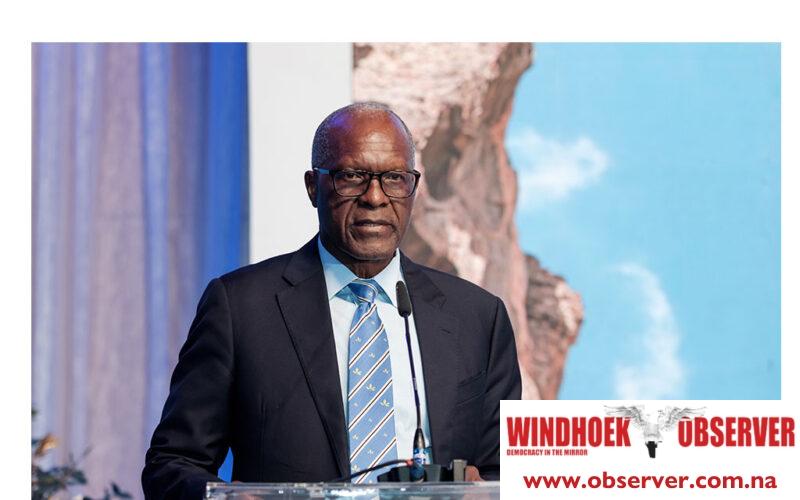Martin Endjala
Mines and Energy Minister, Tom Alweendo says the mining industry remains the bedrock of Namibia’s economy, contributing about N$6.4 billion in royalties and taxes in 2023, compared to N$4.2 billion in 2022.
These statistics, he said, indicate that the mining industry remains the bedrock of the economy.
Alweendo was speaking at the launch of the China National Nuclear Corporation (CNNC) Rӧssing Uranium 2023 Sustainability and Performance Report at the Windhoek Country Club Resort and Casino on Tuesday evening.
“The good performance of Rössing Uranium is not success in isolation, but it is rather a part of a bigger mining industry that significantly contributes to the Namibian economy,” he said.
Rӧssing Uranium recorded N$6.48 billion in revenue compared to N$4.48 billion in 2022.
The company made a net profit of over N$1.3 billion and spent N$2.86 billion on local procurement.
Alweendo said the mining industry now employs around 18 189 people and contributes a total expenditure of N$211 million in corporate social responsibility.
He said the ministry remains optimistic about the Namibian mining industry’s trajectory and commends all mining industry stakeholders for their positive contribution to the Namibian economy during 2023. Last year, the mining industry spent more than N$21 billion on local procurement.
Alweendo stated that the renewed rise in interest in nuclear energy is a positive development for the country as a notable uranium producer globally.
“Uranium prices surpassed US$100 per pound, and if the uranium market conditions are combined with the emerging green hydrogen industry, Namibia can become a regional powerhouse,” he said.
In order to minimize ecological disruption and prevent long-term damage to the country’s delicate socio-environmental ecosystems, the mines minister issued a warning.
He said responsible mining necessitates a long-term perspective that considers the needs of future generations.
He called on industry players to abandon short-sighted approaches that prioritise immediate gains at the expense of the industry’s long-term sustainability.
According to Rӧssing Uranium managing director, Johan Coetzee, the company paid N$177 million in dividends and invested N$41 million in social investment.
In 2023, the company also produced 2920 metric tonnes of uranium oxide, contributing 4.5% to Namibia’s 13% world primary production of uranium.
“Looking forward, we will continue to lead in sustainability and performance excellence. 2024 will be an important year as we begin the substantial pushback work for the Phase 4 extension while evaluating new opportunities that could extend the life of mine beyond 2036,” he said.
The company board approved the life-of-mine extension project (LoME) in February 2023, and in March 2023, a 13-year contract was signed with Beifang Mining to provide a full contract mining service from 2024 to 2036.
According to Coetzee, the company invested N$140 million in previously disadvantaged Namibians and small and medium enterprises.
The company currently has a workforce of 871, of which 98.74% are Namibians, with an overall training and development cost of N$28 million.
The company also celebrated five years of a majority shareholding in China National Uranium Corporation.
Zhao Weiping, the Ambassador of the People’s Republic of China to Namibia, said through the launched report that the Rössing has proven the leadership of Chinese enterprises in global social responsibility and sustainable development.
This, he said, also proved the efforts of his countrymen to build a more prosperous, just, and green world.
“The successful development of CNNC in Namibia has vividly illustrated the friendly cooperation between the two countries. I believe that with the efforts of many Chinese companies represented by CNNC, cooperation between China and Namibia in various fields will continue to make breakthroughs, bringing more concrete benefits to the people of both countries,” he said.
He said this would promote practical cooperation between China and Namibia to produce fruitful results and make greater contributions to the sustainable development of both countries’ economies and societies.




